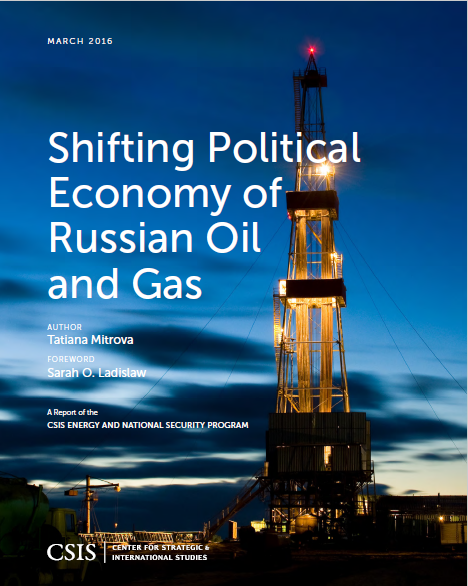Shifting Political Economy of Russian Oil and Gas

Dramatic changes in the Russian energy strategy and energy-based political alliances are to be expected due to the evolution of the domestic oil and gas market resulting from the economic crisis and sanctions linked to the annexation of Crimea.
Russia is one of the world's largest hydrocarbon resource holders, producers, and exporters, with nearly 6 percent of global proved oil reserves, 13 percent of the world's oil production, 12 percent of global oil exports, 17 percent of the global gas reserves, 19 percent of global gas production, and 24 percent of global cross-border gas trade in 2013. It is a dominant oil and gas supplier both for the European Union and the Commonwealth of Independent States, and holds great influence over both markets.
Russia is now going through an uncertain and difficult economic and energy transition. The economic slowdown, ongoing since 2012, was exacerbated in 2014 by dual external shocks from the sharp decline in oil prices and the imposition of financial and technology-oriented sanctions. Together with shifting markets for Russia's exports and its own domestic economic and political dynamics, these factors are spurring dramatic and impactful changes in the Russian domestic oil and gas strategy, as well as its view toward future energy markets and energy-based geopolitical alliances. These changes, while not yet complete or predetermined, will impact geopolitics, energy security, oil and gas revenue to the health of the Russian economy, and Russia's role as a hydrocarbon exporter and provider of oil and gas infrastructure, it is critical for analysts and policymakers to understand the evolution of Russia's oil and gas sector and its anticipated realignment.
This study is focused on how the Russian oil and gas sector is evolving and might continue to change under current circumstances. It includes a summary of the changes that have taken place to date, an examination of future potential changes under a range of oil price scenarios, and the potential means Russia might use to overcome those challenges.
This content is available on the CSIS' website: Shifting Political Economy of Russian Oil and Gas

Available in:
Regions and themes
Share
Related centers and programs
Discover our other research centers and programsFind out more
Discover all our analysesRussia, the Palestinians and Gaza: Adjustments after October 7th
The Soviet Union (USSR), and subsequently the Russian Federation as its internationally recognized legal successor, has consistently sought to play a visible role in efforts to resolve the Israeli-Palestinian conflict.
Deathonomics: The Social, Political, and Economic Costs of War in Russia
The report attempts to outline and examine a truly new phenomenon in Russian society, dubbed “deathonomics”—the making of a mercenary army against the backdrop of the Kremlin’s war in Ukraine, eventually replacing both the Soviet (conscript) and early new Russian (contract) armies. It notes that, by the end of 2023, this trend had turned the military service into one of the highest-paying professions in the country, something not seen in Russia on such a scale since the late 17th century.
Russia's Asia Strategy: Bolstering the Eagle's Eastern Wing
Among Russia’s strategic priorities, Asia traditionally played a secondary role compared to the West. In the mid-1990s, then Foreign Minister Yevgeny Primakov initiated a rapprochement with China and India. Then, in 2014, deteriorating relations between Russia and the West prompted Moscow to begin its “great pivot to the East”.
Kazakhstan After the Double Shock of 2022: Political, Economic and Military Consequences
The year 2022 represented a dual shock for Kazakhstan. In January, the country faced its most severe political crisis since independence, followed in February by Russia’s full-scale invasion of Ukraine, which cast uncertainty over the borders of post-Soviet states. These consecutive crises profoundly shaped Kazakhstan’s domestic and foreign policy.










